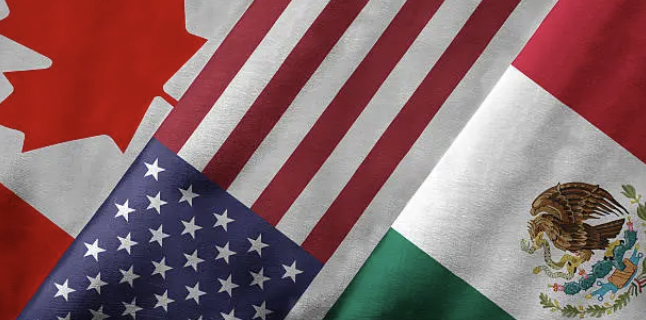President Donald Trump has imposed a 25% tariff on all goods from Canada and Mexico. This tax makes products from those countries more expensive when they enter the U.S.
Trump said the main reason for the tariffs is to stop illegal immigration and drug trafficking, especially fentanyl. He believes that putting financial pressure on Canada and Mexico will force them to step up their efforts at the border. His administration has argued that these countries haven’t done enough to prevent the flow of illegal drugs and migrants into the U.S. and that these tariffs will push them to take more decisive action.
Canada and Mexico are not happy about this. They’ve thought about hitting back with their tariffs on American goods. If that happens, American businesses that export products to these countries could also suffer. Mexico has also hinted at increasing prices of agricultural goods that the U.S. relies on, like avocados and tomatoes. Since the U.S. imports nearly 45% of its fresh vegetables and 39% of its fruit from Mexico, these new tariffs could make grocery shopping much pricier. Experts say that if Mexico retaliates, the U.S. could see price increases on other popular products like beer, tequila, and cars.
At first, Trump agreed to pause the tariffs for a month so Canada and Mexico could improve their border security. But on March 4, 2025, the tariffs officially went into effect. Since then, there’s been talk of a trade war, essentially when countries throw tariffs at each other in retaliation. History has shown that trade wars can slow economic growth, hurt businesses, and lead to job losses.
One of the biggest problems is that U.S. prices could increase. Since many of our products come from Canada and Mexico, American businesses must pay more to get them. Consumers end up paying extra costs, which means food, cars, and everyday household items become more expensive. Industries that rely on imported materials, like car manufacturers and tech companies, could see their costs rise, resulting in layoffs or higher product prices.
Some experts have said this could lead to inflation, which means the cost of living increases overall. That would make it harder for families to afford necessities, possibly hurting the economy in the long run. Small businesses that rely on affordable imports might also struggle, which could lead to closures.
Supporters of the tariffs have argued that they’ll help protect jobs by encouraging companies to produce more stuff in the U.S. Critics argue that it could make things harder for regular people. Some have even said that it could cause diplomatic tensions between the U.S. and other nations, making trade agreements harder in the future.
It’s hard to say how this will all play out right now. So, the next time you shop and notice prices rising, this whole tariff situation might be the reason.









